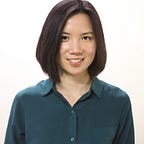From Biology to Technology
When I decided to switch from Biology to Business, I didn’t know where to start — because I hadn’t done anything other than science until graduate school. All my part time and summer jobs revolved around working at a lab bench. I rarely got to work with non-scientists. Science was the only topic that I was confident in speaking.
Entering the world of business made me feel socially awkward. I had to learn the basics of business etiquette, from networking to writing concise emails.
Having English as my second language didn’t help. When I was nervous, I could hardly put words together without grammatical errors. Before sending an important email, I would ask my friends who had business experience to proofread my emails. Many times.
Searching for my first job
Communication skill was what I needed to work on. Taking a client facing role would allow me to speak to customers all day long. So I submitted resumes to stores in the malls, including McDonald’s. I was desperate — but I didn’t even get an interview.
Even a high school student can get a job at MacDonald’s. How could you possibly get rejected? My self-esteem dropped to rock bottom.
My graduate degree was working against me. I remember a clothing store manager looked at my resume and was baffled by why someone with a Master’s degree would want to work there.
Every rejection reinforced the idea that I should go back to where I was comfortable with.
However, my mind was distracted whenever I was doing experiments. (While I was exploring the business world, I was working in the lab part time.) It was a confirmation that leaving research is a one-way street.
Working for free
What I needed was a stepping stone to get some experience. So I did five volunteering roles in a year while working part-time in the lab.
I learned how to write blogs, host events, write marketing materials. It was a learning curve to write anything other than scientific papers. But I learned to speak business language, other than presenting research data. It was a transition that I needed.
First job outside of science
Finally, my friend happened to know someone who worked for a startup. The company was looking for its first call centre agent.
The first order I took, I had to ask for their credit card for at least 3 times. I was so nervous that I couldn’t hear a single word. Explaining our product was even worse. I could barely formulate a proper sentence without a long pause. The other side of the line would go “What?”.
I could sense that my manager could hear me stuttering over the phone. I swore I was going to get fired within the first week.
I was then asked to write a product manual. That was my chance to shine. Because it was a health product that requires explaining biologic concepts in layman terms. I could do that! During the day, I was still picking up calls. At night, I continued my writing, hoping that this would save my job.
I went above and beyond researching what other competitors in the market explained their products. I studied how their customers explain their pain points — so I can better draw the connections.
Researching a topic, digesting a vast amount of information and consolidating them is what I was trained for as a scientist. Years of research experience suddenly became useful in the world of business.
How quickly I was able to learn the product and the market got the CEO’s attention. I started to write more marketing materials. Their sales skyrocketed.
Within a month, they took me off the phone and hired more support staff — so I could focus on writing for their new products. I got to train and grow a team so they had the same knowledge that I did. I was promoted from Customer Support Agent to Product Manager.
Transition to Tech
One day, I got a LinkedIn message from a recruiter asking to speak to me. “Is this a scam? I thought to myself?” I sent my resumes to numerous recruiting agencies before — and I heard nothing.
I kept an open mind and learned the job is a Water Quality Management SaaS software. Their users are technicians. They were looking for someone who could speak the scientific language. My Biology background fits the bill.
I was given 10 pages of documents to read before my interview. It was a mock interview pretending I was training a client.
I experienced tremendous self-doubt going into the interview. Those days of submitting resumes in the mall and getting rejected hadn’t left me. To quiet my negative voice, I focused on my strength — the research and learning abilities I developed from graduate school. My fear of not getting the job drove me to prepare all the possible questions that they would ask me.
On top of those 10 pages of document, I did additional research online to study the company’s product over a weekend. Within the first 5 minutes of the interview, I knew I got the job. This was my first step of getting into Tech, a field that is considered to be the hottest job market today.
This quote Steve Jobs perfectly summarize my career transitions.
“You can’t connect the dots looking forward; you can only connect them looking backwards. So you have to trust that the dots will somehow connect in your future….Believing that the dots will connect down the road will give you the confidence to follow your heart even when it leads you off the well worn path; and that will make all the difference.”
– Steve Jobs [Stanford commencement speech, June 2005]
